
For Building Owners & Operators
Helps reduce energy costs while reaching sustainability goals
Read Our GuideTrane ComfortSite is an extranet site designed to save you time. With your secure login, you can:
This is the login for Trane® Connect™ and other Trane® commercial applications. Trane® Connect™ is our secure, cloud-based customer portal to access your building systems to remotely monitor and manage building systems, and conduct routine maintenance.
Selecting a language changes the language and content on the Trane site.
Latin America
Europe
Asia Pacific

Discover which experts from Trane will be presenting and what topics they will cover at the upcoming ASHRAE Winter Conference and AHR Expo
Trane Thermal Energy Storage
The proven strategy for more cost-effective, sustainable heating and cooling systems. Now more affordable than ever with an up-to 50% investment tax credit.
:medium-1-1)
Both new and existing buildings need more affordable, flexible ways to heat and cool based on energy availability. The answer is Thermal Energy Storage—which acts like a battery in a heating and cooling chiller plant to help improve energy, cost and carbon efficiency. Besides offering a great ROI, adding thermal energy storage is highly affordable thanks to recent tax incentives.
Trane is your personal thermal energy storage provider, combining leading technology, controls knowledge and systems expertise based on your unique building circumstances. Your local team can collaboratively guide you through a custom, seamless implementation based on your unique goals.
Thermal Battery Storage-Source
Heat Pump System

Through years of research and thousands of installations, Trane has identified water as a very effective material for storing thermal energy for later use. This makes thermal energy storage an optimal means for a chiller plant to collect, store, recover and discharge heating and cooling energy. That’s just the start of what makes it such a powerful solution.
For the first time in its 40-year existence, thermal energy storage now qualifies for federal incentives. Thanks to the $370+ billion Inflation Reduction Act (IRA) of 2022, thermal energy storage system costs may be reduced by up to 50%. Between the IRA’s tax credits, deductions, rebates and more, a thermal energy storage system may cost significantly less than a conventional system.



One Trane thermal energy storage tank offers the same amount of energy as 40,000 AA batteries but with water as the storage material

Trane thermal energy storage is proven and reliable, with over 1 GW of peak power reduction in over 4,000 installations worldwide
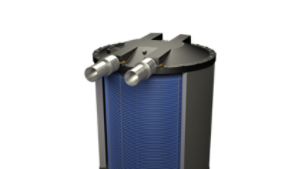
Trane thermal energy storage has an expected 40-year lifespan
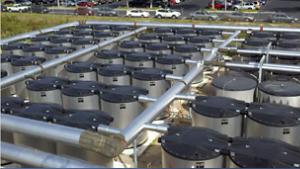
Trane thermal energy storage is modular, easy to integrate and scalable
BENEFITS
Thermal energy storage is a reliable, cost-effective solution to help reduce electricity costs when it’s most expensive and unlocking many other benefits.

Helps reduce energy costs while reaching sustainability goals
Read Our Guide
Provide customers with innovative solutions to help reduce carbon and energy costs
Read Our Technical Overview
Achieve reliable, high-performing installations proven to work
Read our Technical OverviewConsume energy at the most cost-effective times of the day
Recapture waste energy when loads don’t balance
Increase renewable usage by up to 50%*.
Replace fossil fuel boilers with a low-carbon
Have greater protection against grid outages
Participate in grid capacity and demand limit revenue programs
Avoid electrical infrastructure upgrades.
Qualifies for federal incentives and utility rebates
*ASHRAE RP-1607. 2018
Downloads
Dig deeper into how Trane’s thermal energy storage can move the needle on your needed outcomes.
“The commercial market will benefit from $369 billion in incentives and investments earmarked for green energy projects."
“You could pay up to 40 percent less for cooling by avoiding peak time of use rates and reducing peak electricity demand.”
“Most air conditioning systems operate within their most efficient range less than 25 percent of the time.”
Our Approach
Thermal energy storage is more effective when controlled and integrated properly. Trane’s data-backed, consultative approach caters to your exact heating and cooling needs and operational requirements. Compared to other providers, we provide a complete solution with building-level controls and digital services.
Now is the time to reassess your building space and collaboratively plan around your business goals given changing regulatory drivers and new federal incentives.
Local experts best practices in thermal energy storage system design that are specific to your application and goals and then implement solutions.
Localized support and 24/7 remote connectivity deliver proactive maintenance and ongoing optimization, ensuring your uptime and efficiency long after installation.
Our Solutions
Trane’s easy-to-integrate thermal storage tanks—compatible with complete system design guidance, control sequences and points list with operation dashboards—are designed to work reliably. Easy-to-manage pre-packaged with operator dashboards give complete control over system performance.
Made with durable polyethylene, yours can be implemented into a new building or retrofitted when replacing a chiller plant. All you need is space for the tanks, which can go virtually anywhere: inside, outside, on a roof, in a parking garage, even buried.
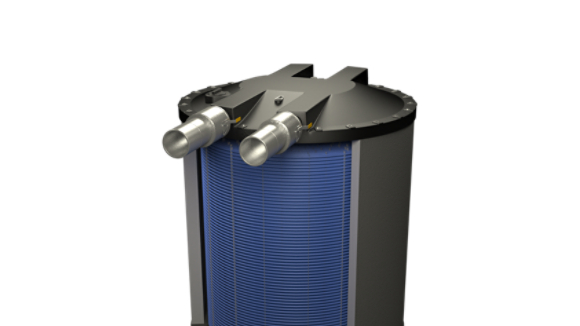
These versatile second-generation tanks are ideal for larger commercial and institutional buildings, making siting and installation easy. Designed with a 20% smaller footprint requirement, Model C tanks can be bolted together to eliminate external piping and reduce installation time and costs.

Ideal for small installations since their introduction in 1979, our Classic Model A tank has been upgraded to the 100% welded PE internal heat exchanger design. They’re designed for individual connection with distribution piping.

Trane Thermal Battery™ systems are premier HVAC plants that provide a distributed resource for our changing grid. Their ability to store thermal energy enables your building to reliably modify HVAC operations to optimize for carbon reduction or energy cost savings.

A Glycol Management System (GMS) makes solution mixing easy by maintaining the proper volume of coolant in a building's circulating loop.
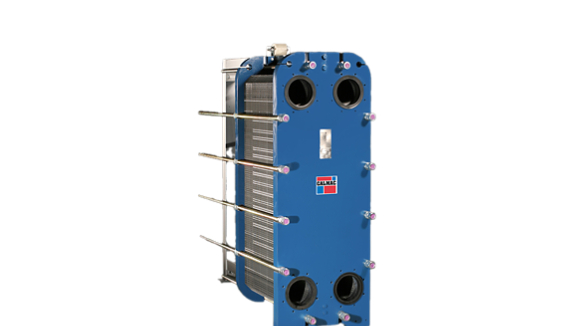
Plate Heat Exchangers are ideal for avoiding cross-contamination in confined spaces.
All types of energy storage are needed for a low-carbon future, and each technology has its own best use case. For maximum efficiency and cost-effectiveness, it’s important to store energy in the same form in which it will be consumed. That means using electrochemical storage to meet electric loads and thermal energy storage for thermal loads.
Electric storage is essential for powering elevators, lighting and much more. However, when it comes to cooling or heating, thermal energy storage keeps the energy in the form it's needed in, boosting efficiency tremendously compared to other forms of electricity.
Explore a range of commercial buildings that have benefited from Trane’s thermal energy storage solutions. Trane utilizes thermal energy storage at many of its current facilities.

Saved 26% in energy costs, or more than $100,000 annually, while achieving LEED Silver certification

Nearly doubled its cooling capacity while decreasing utility costs

Thermal Battery™ System Expected to Cut Shooting Star Casino Annual Energy Costs by up to 35 Percent

Decreased 1.4 million pounds of annual carbon dioxide emissions and created more than $730,000 in annual energy and operating cost savings.

Lowered facility utility rates and eliminated 1.6 megawatts of electricity from the afternoon grid, helping avoid area brownouts
Saved $765,000 in annual operating expenses, generating a 25% internal rate of return and avoiding 6.1 million pounds of carbon dioxide emissions

California State Lottery Headquarters
Reduced cooling costs during peak hours by 21% during both winters and summers, helping achieve LEED Gold® certification.
WHITEPAPER
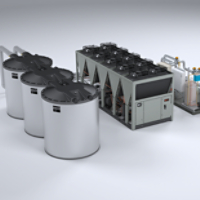
WEBINAR RECORDING

WEBINAR RECORDING

VIDEO

ARTICLE

ARTICLE

ARTICLE/VIDEO
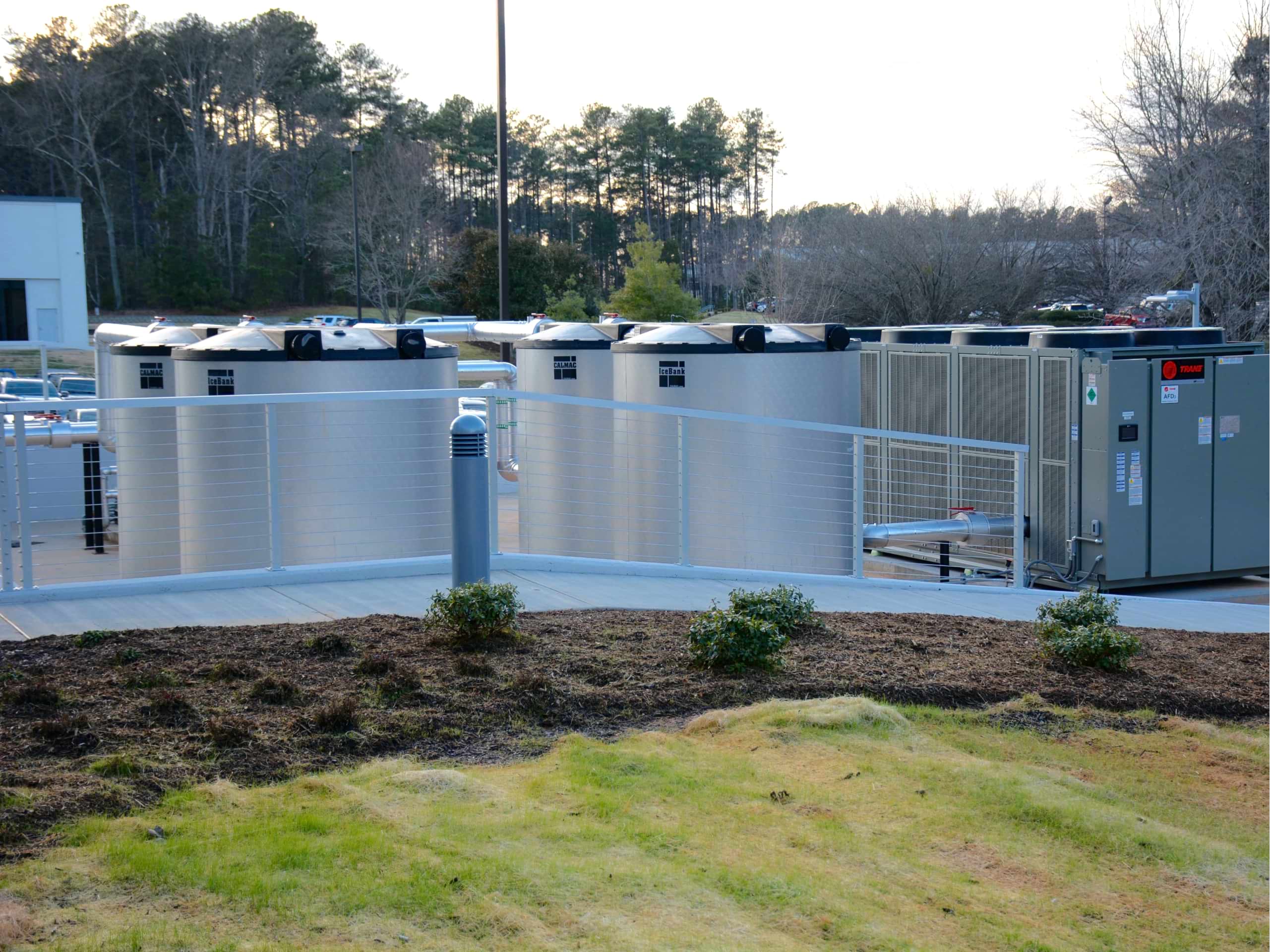
FAQS

ARTICLE

Trane does not provide tax, legal, or accounting advice. This material is for informational purposes only and it should not be relied on for tax, legal, or accounting advice. Tax law is subject to continual change. All decisions are your responsibility, and you should consult your own tax, legal, and accounting advisors. Trane disclaims any responsibility for actions taken on the material presented.
